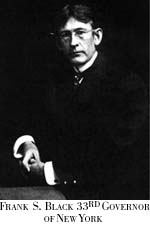

 Precisely because the name of this family is such an obvious example of one that originated in the ethnic description of its founder, the Blacks of Maine could prove of interest, as well.
Precisely because the name of this family is such an obvious example of one that originated in the ethnic description of its founder, the Blacks of Maine could prove of interest, as well.
Black Will was an emancipated slave with as little social influence as Emanuel Drigger had in Virginia. However, a few late 17th century records mention Black Will and give us some idea of how his progeny so quickly blended into the larger white population.
Despite its sexually scandalous nature, the involvement of Black Will in the case of Alice Mayhew, the local whore, must undoubtedly have provided the little town of Kittery a certain degree of comic relief. On the strength of her accusation the court had ruled against another man for being the father of her yet unborn child. A few months later that same man was finally vindicated when, much to the embarrasment of the court, Alice gave birth to a brown skinned baby boy. Since there was no one for miles around who could possibly have fit the bill, it was Black Will who instead had to bare his back at the whipping post a few days later to atone in the prescribed way for the sin of fornication.
Whether or not a whipping was the price he paid for each of his successive children is not too clear but historians have pointed out that two other white women also bore him offspring and that no marriage records exist for either. Unlike his father, however, we do know that William Black Jr. was legally married. Having been summoned to answer the court's charges of fornication, enough witnesses turned up to testify to the domestic nature of his relationship to the woman he was co-habiting with that the court itself arranged to wed them. Although the initial cause for the case concerning William Jr. might well have been a legal approbation against miscegenation, it could just as easily be interpreted as still yet another example of a son following in the footsteps of his father's sexual mores.
Despite the colour of the women that both Black Will and his son would take under their roofs, any supposition that they were consciously attempting to whiten their offspring would be ludicrous. Given the negligible number of Africans living in this particular part of the world at this particular time in history, the possibility of finding a female, much less a compatible one, would have presented a major problem. The fact too, that Black Will stood surety for Anthony Freeman, the only other emancipated slave in the neighbourhood, even providing him the land with which to build his house, is sufficient enough evidence to prove that the seriousness of the situation in which the early African American community found itself was not lost on him.
Bailey's Island at the southernmost end of the Harpswell Peninsula is today a tourist attraction and the historically acknowledged geographical center from which at least half the Blacks or Blakes of Main spread out to other parts of the country.
From the various histories of this family I have been able to track this far, the most politically prominent will, more than likely, turn out to be William Sweat Black. Although he never achieved the presidency - a prospect he must have once seriously entertained, to judge from his career - this distant descendant of Black Will did succeed in serving a term as 35th Governor of the State of New York.
Researched and Written by Mario de Valdes y Cocom.
|